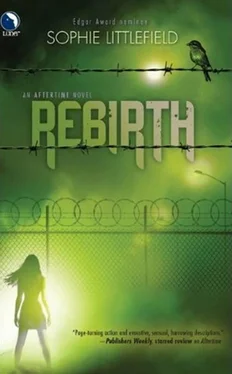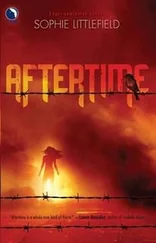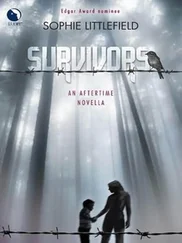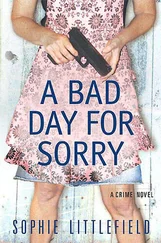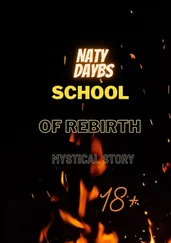But when the lights went out forever, there was a brief and reverent silence when Cass felt as though the soul of the city had been sucked out. It had literally felt as though everyone who was still alive stopped breathing for a moment-and then the first cry carried out on the wind, grief-struck meaningless keening that was more intense than anything she’d heard. It was joined by another and another and another, until the street outside her trailer echoed with a terrible symphony of devastation.
Moment for moment, there was nothing more horrific than the Beaters, of course. And perhaps nothing more poignant than fever death, watching someone you loved slip into a luminous delirium, clutching and babbling, hot-skinned and gorgeous in their last hours, before death saved them from the ignominy of turning. But of all the abominations, the loss of power felt most like the loss of civilization.
There had been little pockets of power since then. Those who owned generators-if they were able to protect them from marauders and looters who would kill for as little as a case of bottled water or a tank of propane-consumed their foul-smelling noisy power in furtive bursts. And of course there were batteries, for a while. Some people jealously hoarded their batteries for emergencies, for flashlights and radios they were convinced would start broadcasting safety instructions again someday, somehow-and others used them up quickly, bingelike, playing music and games and movies on their big or tiny screens. Devices that turned human energy into power-shake flashlights and bicycle generators and the like-were suddenly coveted above nearly everything else.
But here in Colima it was almost as though the power had never gone all the way out. A grid was up and running. Its source was still the temporal and noisy generators, but the idea that Evangeline had planted-turbine and solar power, unlimited! Freely available even in the punished and thwarted new atmosphere!-was intoxicating. Cass wondered how long the novelty would last; people here seemed to have quickly readjusted to the idea of power, to an expectation of its availability. Society absorbed what was available with something approaching indifference. The same people who thought they would never again hear a song on the radio likely now barely registered the loudspeaker system, the space heater in the corner of the room.
It was a little like sobriety. That was the notion that had come to Cass as she’d pretended not to watch and listen to the men talking, fussing with Ruthie and trying to get her to finish eating. The first days of sobriety were a novelty. Hard, but oddly thrilling. You flirted with the idea, telling yourself that it didn’t matter, that you didn’t really need to be there, lumped in with the others, the real addicts. And yet you heard the voices, one day at a time one day at a time onedayatatime, whispering in your mind. You got through the day outside yourself, surprised. Is that me, seriously? Not going to the fridge? Not getting out the bottle? Is that me putting on my pajamas as though I were anyone else, as though I am really not going to have anything before bed? Is this me lying here in this room in the dark, my heart beating so fast I can’t keep up listening to it, as though I could fall asleep and dream like anybody else?
Is this me in this same bed in the morning? Did I really not drink last night? The sheer wonder of that realization is enough to get you through the strange and terrifying morning, when you do not stir whiskey into your coffee, when you do not pretend you left your purse in the car so you can have a quick nip.
And that evening. And the next night. And so on until it’s not new anymore, until sobriety isn’t a surprise but an obligation, a dreary habit. Until you don’t so much congratulate yourself as wonder if this is really any better.
So it must have been for the new Rebuilder recruits. Power. Light, heat. Not like Before, of course-those times had faded like a distant dream-but more or less predictably, and more or less on demand. A thrill, a luxury-safety! Yes, it must feel like safety, that first day.
And the next day, it’s barely diminished. The day after that, if you are a believer, perhaps you are still thanking your god…but maybe the next day you reach for the switch and bathe the room in light and you forget to be quite as grateful. And before long it’s just another habit of your new life. Switch, the light comes on…switch, it goes off. You grow complacent.
But for tonight, at least, Cass let herself feel grateful. The temperature was still chilly enough that Ruthie’s nose was ice-cold when Cass bent to kiss it, though she was warm under the stack of blankets, sleeping deeply. Cass accepted the maroon parka Kaufman offered her from a stash in a closet, and she would have drawn her chair near the space heater in the center of the room, under the single light fixture, if Kaufman hadn’t gotten there first, settling into a folding chair with an old Vince Flynn thriller. Cass didn’t feel like making conversation, so she sat on the edge of Ruthie’s bed, absently rubbing her back through all the blankets. Malena hadn’t left her son’s side. It appeared that he would spend the night in the chair, rather than one of the beds; Cass could hear her murmuring to him softly from time to time.
Dor seemed restless, pacing the room, picking up objects and putting them down, looking out the windows into the darkness. When Lester returned, he was in the kitchen alcove, drinking a glass of water that he poured from a large plastic pitcher. He set down the glass and Cass watched him tense. Without a weapon, he seemed at a loss. His hand went to his hip where he carried his gun and, finding it missing, he made a fist and thumped it lightly against the counter.
“Back so soon,” Kaufman said in a playful falsetto, putting down his book. “How was your evening, darling?”
“Ah, fuck you, dear,” Lester retorted. Both of them seemed to be making an effort at cheer. Lester closed and locked the door carefully behind him, and then stood for a moment blinking in the pool of light and scanning the room. “Everybody accounted for?”
“Yeah, we’re all happy campers here. Got the hatches battened down and so forth. Fact I was just trying to decide between the Macallan 12 and the 15,” Kaufman added sarcastically.
“Yeah? I’d take the 12 any day. Anyone pays more for three more years in the cask’s just throwing money away, you ask me.”
“Hey,” Kaufman said, “you think they’re still making that shit over there? I mean that’s some pretty primitive work, you know? Burning peat and all? I seen this picture of this scotch factory or distillery or whatever they call it, they got like these scythe things? Old dudes wearing waders and tromping around the countryside. Hell, it’s a perfect industry for Aftertime. Got nothing but time to let that shit ferment over a peat fire. Nothing but time, Aftertime. What do they make it out of, anyway? Do you know, MacAlister?”
Dor pushed himself off the counter and wandered closer to the other men. Lester helped himself to a chair, his posture ramrod straight and his eyes roving restlessly over the floor. Kaufman looked worried. Cass guessed he was trying to take his friend’s mind off the things he’d just seen and done. The execution…the rifles, no one knowing which carried bullets and which blanks. The body slumping forward in death.
The unlucky ones who had to haul it away, a bag over its head to guard against exposure to any post-mortem fluids. Would there be graves here in Colima? Trenches? Pyres? Some other method?
“Barley, I think,” Dor said.
“You Scottish? Ain’t that your people make that stuff?”
“My mother was Afghani. My dad was Irish. Came here in ’88. Only drink my mom knew how to make was Nestlé Quik, and my Dad was a Bud man.”
Читать дальше
Конец ознакомительного отрывка
Купить книгу
